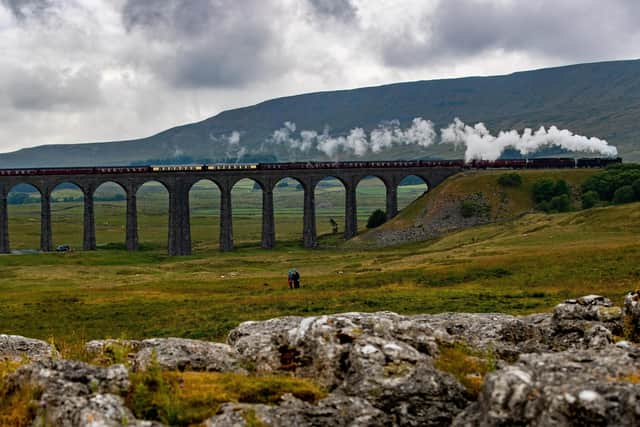West Coast Railways: Flying Scotsman operator says it will be 'destroyed' by £7million bill to fit modern doors to carriages - after safety incident at York Station
West Coast Railway Company Ltd (WCRCL) took legal action against the Office of Rail and Road (ORR) after it refused to exempt the company from rules banning the use of hinged doors without central locking earlier this year.
The company complained that the multimillion-pound cost of having to retrofit central locking could “destroy” its business and argued its door systems were just as safe.
Advertisement
Hide AdAdvertisement
Hide AdBut in a ruling on Friday, a judge dismissed the operator’s case and concluded that the ORR had taken a “justifiable” approach.


Mrs Justice Thornton said in her written judgment that WCRCL is the largest operator of “heritage train tours” in the UK.
The company runs tours hauled by the Flying Scotsman on charter agreements, and chairman David Smith, who lives in Staintondale, near Scarborough, is a steam enthusiast who has bought and restored Aysgarth Station in the Yorkshire Dales.
The judge said a feature of WCRCL’s Mark I trains is their hinged doors which “can be opened by anyone inside the train even when the train is moving”.
Advertisement
Hide AdAdvertisement
Hide AdIn October 2020, a WCRCL service left York Station with a door open, and in a further incident two years later a passenger overpowered a steward to open a door while a train was moving.
Instead of a central locking system, WCRCL’s vehicles have a “secondary” mechanism where doors are pulled shut into a locked position and a bolt is used on the inside of a coach.
The ORR, the safety regulator on Britain’s railways, told the judge that “it does not wish to see heritage train operators go out of business” but from March this year wanted to ensure heritage trains “meet minimum safety standards” by introducing central locking.
Safety regulations were made in 1999 after passengers were killed or injured by falling from the doors of Mark I trains or being hit by doors opened at platforms, the court was told.
Advertisement
Hide AdAdvertisement
Hide AdIn January 2005, a rule came into force banning rolling stock with hinged doors without central locking, but the regulator can issue exemptions.
WCRCL’s legal challenge centred on an ORR exemption refusal in January and March.
The operator currently has an exemption in place until February 29 2024, after a whistle-blower report triggered an ORR inspection that led to safety changes by WCRCL earlier this year.
The company, whose trains run at speeds of up to 100mph, argued in court that its door procedures were as safe as a central locking mechanism, with train stewards operating them and warning signs for passengers.
Advertisement
Hide AdAdvertisement
Hide AdThe ORR disagreed and took the view that WCRCL was “unable to demonstrate that its controls of the risks from secondary door locking make it as safe as central door locking”.
The operator claimed the ORR’s earlier decision was a “serious interference” that the regulator had “wholly failed” to justify.
At a hearing last month, WCRCL’s lawyers said it would “destroy” the business if it had to spend around £7million to fit central locking, “which is approximately seven times the company’s average annual net profit, thereby wiping out the company’s profits for the best part of a decade”.
They said £50 million in economic value to the wider community would be lost “if the business does not survive”, claiming this had been “disregarded” by the ORR alongside other considerations.
Advertisement
Hide AdAdvertisement
Hide AdThe Jacobite contributes £19.3 million a year to the Scottish economy on top of £4.72 million in ticket revenue from 101,429 passenger journeys, the court was told.
ORR was accused of acting disproportionately and unlawfully, while it was also alleged it had “misinterpreted” safety regulations.
But Mrs Justice Thornton concluded that “the general interest lay firmly in favour of refusing (WCRCL)’s application for an exemption”.
She said it was “common sense” that a central locking system was safer than one “dependent on no more than an assumption by the guard that the stewards have locked the doors”.
Advertisement
Hide AdAdvertisement
Hide AdThe ORR’s upper estimate to fit out four trains for daily use with central locking was just under £1.4 million, the judge said, adding that a “modest” rise in fares – amid WCRCL having a “monopoly” – should allow it to pay for fitting the system “in a phased manner”.
A £10 increase in the Jacobite service fare, where an average return ticket is £46.58, would generate about an extra £1 million per year in revenue with no additional overheads, Mrs Justice Thornton said.
She added that almost all other heritage train operators had accepted the requirement to install central locking, passing on the cost to customers and that ORR was willing to allow a transition period for retrofitting.
Welcoming the ruling, an ORR spokesperson said: “As the rail regulator, we are committed to ensuring the safety of all passengers.
Advertisement
Hide AdAdvertisement
Hide Ad“Other charter heritage operators which use the mainline railway have made the necessary investment to install central door locking on ‘hinged door’ carriages and it remains open to the West Coast Railway Company Limited to do the same.
“Such converted carriages can both retain their heritage appeal yet also reflect minimum modern safety standards.”
Comment Guidelines
National World encourages reader discussion on our stories. User feedback, insights and back-and-forth exchanges add a rich layer of context to reporting. Please review our Community Guidelines before commenting.